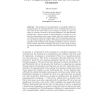Free Online Productivity Tools
i2Speak
i2Symbol
i2OCR
iTex2Img
iWeb2Print
iWeb2Shot
i2Type
iPdf2Split
iPdf2Merge
i2Bopomofo
i2Arabic
i2Style
i2Image
i2PDF
iLatex2Rtf
Sci2ools
111
click to vote
LACL
1998
Springer
1998
Springer
Strict Compositionality and Literal Movement Grammars
Abstract. The principle of compositionality, as standardly defined, regards grammars as compositional that are not compositional in an intuitive sense of the word. There is, for example, no notion of a part of a string or structure involved in the formal definition. We shall therefore propose here a stricter version of compositionality. It consists in a conjunction of principles which assure among other that complex signs are in a literal sense made from simpler signs, with the meaning and syntactic type being computed in tandem. We shall argue that given this strict principle, quite powerful string handling mechanisms must be assumed. Linear Context Free Rewrite Systems (see [13]) are not enough to generate human languages, but most likely Literal Movement Grammars will do. A grammar is compositional if the meaning of a (complex) expression is determined from the meaning of its (immediate) parts together with their mode of combination. A language is compositional if there is a composi...
| Added | 06 Aug 2010 |
| Updated | 06 Aug 2010 |
| Type | Conference |
| Year | 1998 |
| Where | LACL |
| Authors | Marcus Kracht |
Comments (0)

